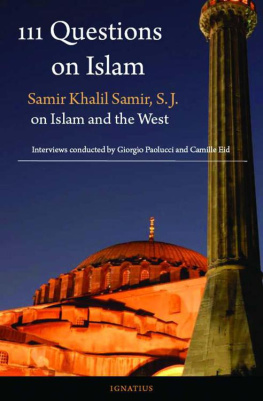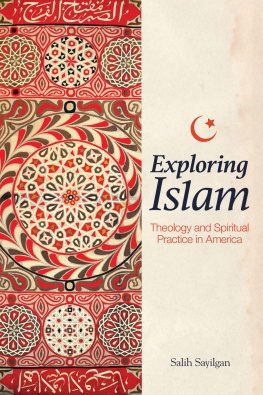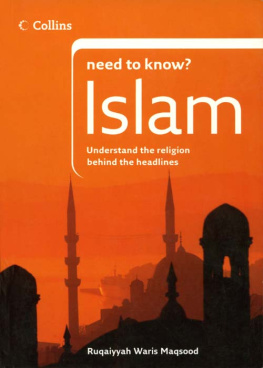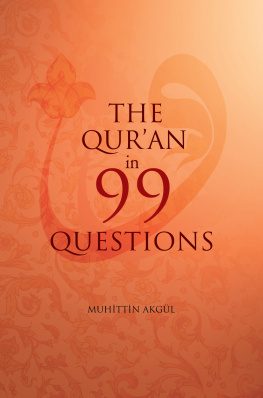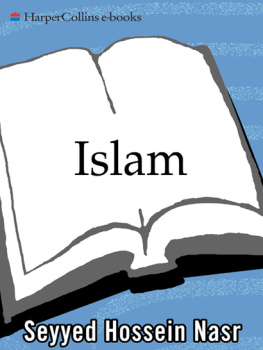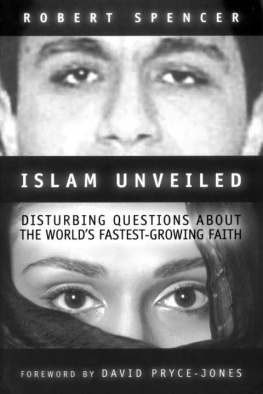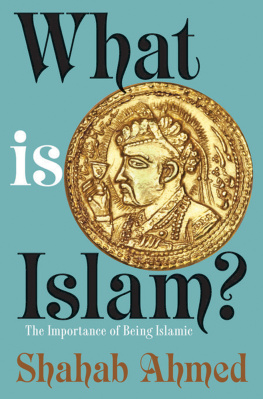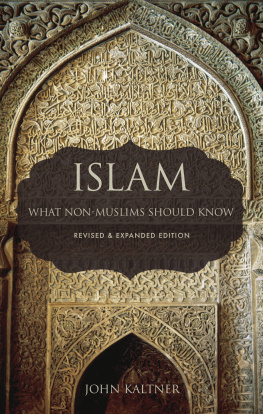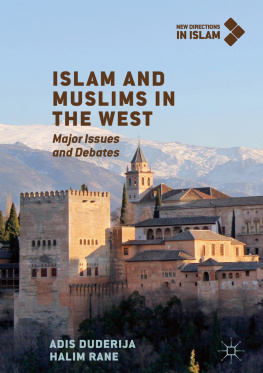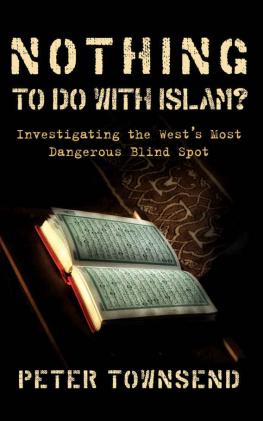111 QUESTIONS ON ISLAM
111 QUESTIONS ON ISLAM
SAMIR KHALIL SAMIR, S.J.
on Islam and the West
A Series of interviews conducted by
Giorgio Paolucci and Camille Eid
Edited and translated by
FATHER WAFIK NASRY, S.J.
Co-translator:
CLAUDIA CASTELLANI
IGNATIUS PRESS SAN FRANCISCO
Original Italian edition:
Cento domande sullIslam: Intervista a Samir Khalil Samir
Copyright 2002 by Casa Editrice Marietti S.p.A., Genoa-Milan, Italy
Unless otherwise noted, Scripture quotations (except those within citations) have been taken from the Revised Standard Version of the Holy Bible, Second Catholic Edition, 2006. The Revised Standard Version of the Holy Bible: the Old Testament, 1952, 2006; the Apocrypha, 1957, 2006; the New Testament, 1946, 2006; the Catholic Edition of the Old Testament, incorporating the Apocrypha, 1966, 2006; the Catholic Edition of the New Testament, 1965, 2006 by the Division of Christian Education of the National Council of the Churches of Christ in the United States of America. All rights reserved.
Unless otherwise noted, the verses of the Qurn have been taken from The Koran , translated by N.J. Dawood (Penguin Classics, 1956; fifth revised edition, 1990). Copyright N.J. Dawood, 1956, 1959, 1966, 1968, 1974, 1990, 1993, 1997, 1999, 2003. Reproduced by permission of Penguin Books Ltd., London.
Cover photograph:
The Hagia Sophia in Istanbul
istockphoto / Bill Stamatis
Cover design by Roxanne Mei Lum
2008 by Ignatius Press, San Francisco
All rights reserved
ISBN 978-1-58617-155-1 (PB)
ISBN 978-1-68149-000-7 (E)
Library of Congress Control Number 2006939361
Printed in the United States of America
CONTENTS
Preface to the English Edition
It Is a Fact That Muslims Are Now Part of Western Society
Due to large-scale immigration to Europe and the Western nations from Muslim countries since World War II, Islam is no longer a distant, exotic religion. In fact, Muslims are present throughout Europe and in many parts of the United States. Demographers project that the number of American and European Muslims will increase in the immediate future.
At present, Europeans are dealing with the challenge of protecting their values while seeking a solution to the social ills of alienation, segregation, poverty, and terrorism associated with the Muslim immigrants. Europeans express concerns about the rapid development of Eurabia.
Since the terrorist attacks on the World Trade Center Twin Towers in New York City on September 11, 2001, Islamophobia has spread through the Western nations. The following pages were prepared to help readers understand three things:
1. how Muslims and Christians can coexist peacefully;
2. what are the causes for the deep unrest that pervades the entire Muslim world;
3. and what are the means to promote greater dialogue and understanding between Muslims and Christians that will lead to a joint social, universal, and political effort for the benefit of all people.
In order to remain sensitive to and balanced in discussing the past and present situation, a question-and-answer format is used. The author responds to a series of questions posed by two journalists, one Italian and the other Lebanese. The intent of this balanced approach is to offer readers a clear portrait of Islam.
Muslims and Christians: How to Live Together
Islam shares some common elements with Christianity but also has many differences. The Muslim culture is quite different from that which emerged in the Western world as a result of the influence of Christianity. Because of massive demographic movement, both groups are now obliged to live together in contemporary society.
The Muslim world today faces one of the most profound identity crises in its entire existence. Comprising nearly 1.5 billion people living on all continents, it is struggling to find a common position for all Muslims. The search for identity has become particularly acute since the abolition of the khalifate (the office of Muhammeds successor, as head of Islam) on March 3, 1924, by Kemal Atatrk. The khalifate was the last representative symbol of unity of all Muslims. Therefore, contemporary Islam has no single recognized authority that would accomplish Muslim unity.
What are the foundations of Islamic faith? Why does Islam seem to be growing so fast today? What is the true meaning of the word jihd , in the Qurn and Islamic tradition, and in modern Arabic? Is it correct to say that men are superior to women in Islam, or is it just a clich? Does religious freedom exist in Islam?
Furthermore, how does the Qurn present the life of Jesus? What is the Qurns view of Mary? And of Christians and Jews? And of other religions? Is Islam a religion of peace, or one of violence? Can we reconcile Islam with democracy and modernity? Can we reinterpret the Qurn for our era? Does Islam distinguish between politics and religion?
Modernity Is Difficult to Accept
After having passed through centuries of stagnation, the Muslim world is experiencing great difficulty in facing modernity. The Christian world has had the leisure of several centuries since the Renaissance and the Enlightenment, since the French and American revolutions, and since industrialization to assimilate modernity slowly. Modernity is a concept that is foreign to many Muslims. This is exacerbated due to the fact that most Muslim countries suffer from widespread illiteracy and are governed by authoritarian political regimes or dictatorships. The concept of human rights is foreign to a large segment of the population.
There is an additional psychological barrier to accepting modernity. Many Muslim countries have experienced diverse forms of European colonization over the past two centuries. As a result, their attitude toward the West, modernitys birthplace, is ambiguous. This is a mixed attitude, one of simultaneous attraction and rejection. Moreover, because the West has become increasingly secularized in modern times, that is, rejecting many ethical principles and values that were common to both peoples, modernity appears to Muslims as a breeding ground for atheism and immorality.
Finally, the memory of the glorious period of the Middle Ages, especially between the ninth and twelfth centuries, when intellectual and scientific activities in the Muslim world had peaked and actually exceeded the achievements of the West, makes the current scientific and intellectual decline even more difficult to accept.
The Seeds of the Malaise
This current state of malaise results from the very sources of the Muslim faith: the Qurn, the sunna (Islamic traditions connected to Muhammad), and tradition.
Many Westerners fear Islam as a religion of violence. Muslims often call simultaneously for tolerance and understanding as well as for violence and aggression. In fact, both options are present in the Qurn and the sunna . These are two legitimate mannerstwo distinct ways to interpret, to understand, and to live Islam. It is up to the individual Muslim to decide what he wants Islam to be.
It is necessary that we return to the very sources of the Muslim faith (the Qurn and the sunna ) and proceed rapidly through history until we arrive at this very day. This book, therefore, aims at presenting the Islamic faith in an objective manner, at providing a sure knowledge of this faith, and at helping people to engage in a profound reflection from a double point of view: that of history and that of modernity.
To Live and Build the Future Together
This volume intends to promote understanding and encounters between Muslims and Christians. It aims to provide the groundwork for dialogue, in the true meaning of the word, not as a search for some compromise between these two worlds but in a sincere and unswerving commitment to truth, with openness to the other side. Ambiguous speech serves neither Muslims nor Christians but creates only more confusion. The commentary shows that both of these cultural and religious traditions have many things in common, as well as many differences. Accepting the differences of another group does not mean surrendering ones human, spiritual, or religious convictions.
Next page
